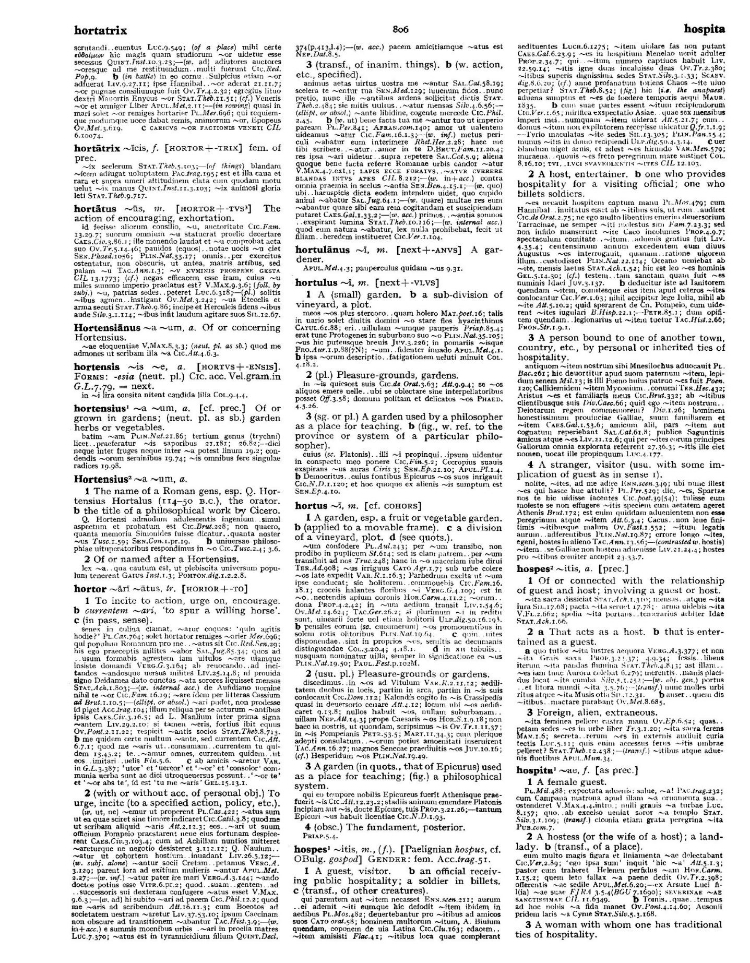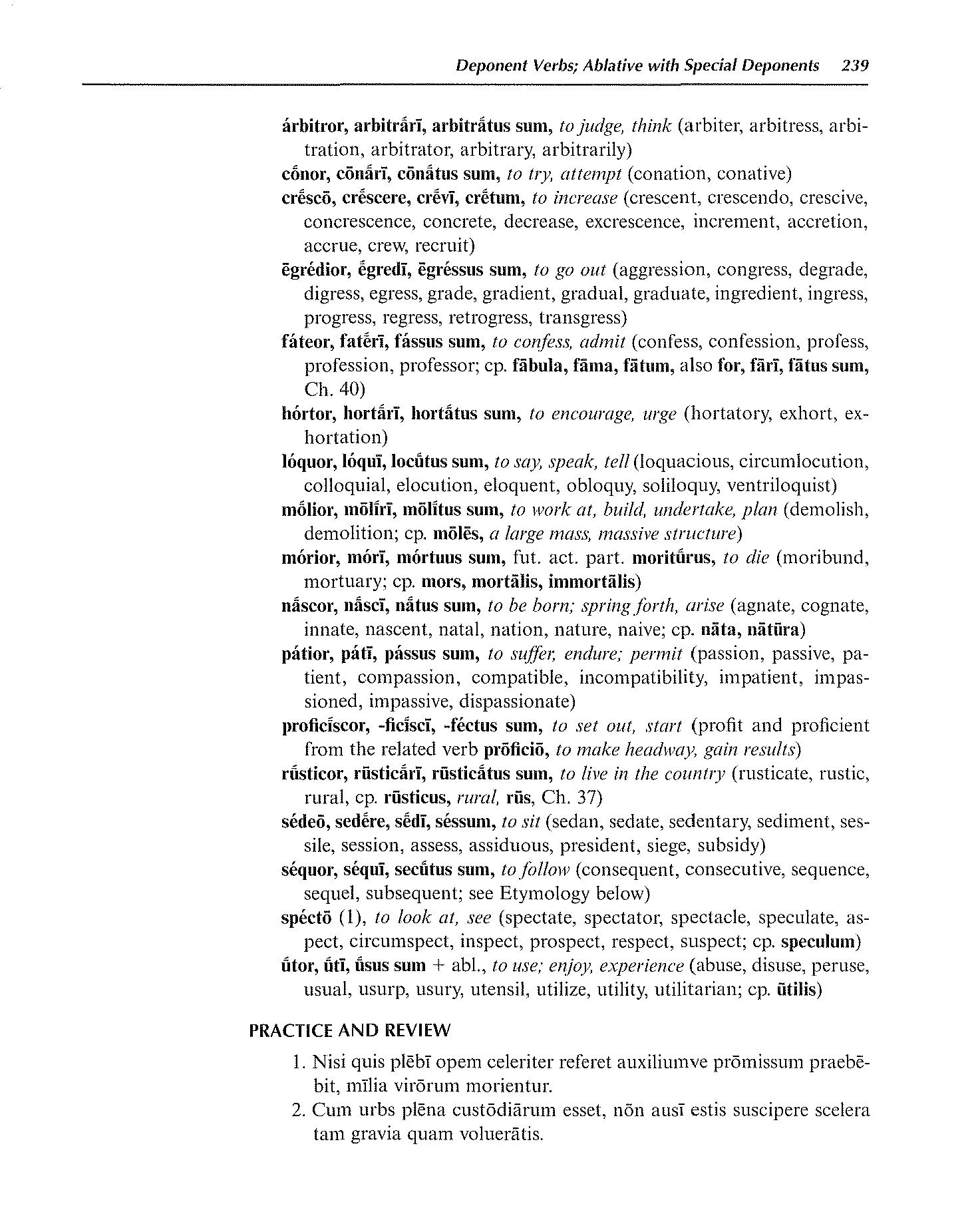
page_listing.tpl
page_subListingDetails.tpl
sub_listingDetails_style1.tpl
sub_listingDetails.title.tpl
hortārī to urge
hortārī is a Latin Verb that primarily means to urge.
Definitions for hortārī
Wheelock's Latin
Verb
- 1
to encourage, urge
English derivatives:
hortatory exhort exhortation
Oxford Latin Dictionary
Verb
- 1
To incite to action, urge on, encourage. (b) currentem ~ari. 'to spur a willing horse'. (c) (in pass. sense).
- 2
(with or without acc. of personal obj.) To urge, incite (to a specified action policy, etc.).
- 3
(transf., of inanim. things. (b) (w. action, etc., specified).
Sentences with hortārī
Latin to English
Tū mē hortāris ut sim animō magnō et spem salūtis habeam, sed timeō nē sim īnfīrmior.Compare You urge me to be of great courage and to have hope of safety, but I fear that I may be too weak.
Spēs vīvendī post mortem multōs hortātur.Compare The hope of living after death encourages many people.
Multus tu hortor non debeo.Compare I ought not to exhort you at greater length.
Hortor signifer, ut ocius eo.Compare They urge the standard-bearers to go faster.
Conjugation table for hortārī
Cactus2000
| ACTIVE | |
| Indicative present | Indicative imperfect |
| hortor hortāris hortātur hortāmur hortāminī hortantur | hortābar hortābāris hortābātur hortābāmur hortābāminī hortābantur |
| Indicative perfect | Indicative pluperfect |
| hortātus sum hortātus es hortātus est hortātī sumus hortātī estis hortātī sunt | hortātus eram hortātus erās hortātus erat hortātī erāmus hortātī erātis hortātī erant |
| Indicative future | Indicative future perfect |
| hortābor hortāberis hortābitur hortābimur hortābiminī hortābuntur | hortātus erō hortātus eris hortātus erit hortātī erimus hortātī eritis hortātī erunt |
| Subjunctive present | Subjunctive imperfect |
| horter hortēris hortētur hortēmur hortēminī hortentur | hortārer hortārēris hortārētur hortārēmur hortārēminī hortārentur |
| Subjunctive perfect | Subjunctive pluperfect |
| hortātus sim hortātus sīs hortātus sit hortātī sīmus hortātī sītis hortātī sint | hortātus essem hortātus essēs hortātus esset hortātī essēmus hortātī essētis hortātī essent |
Infinitive present hortārī Infinitive perfect hortātum esse Infinitive future hortātūrum esse | Imperative present hortāre hortāminī Imperative future hortāto / hortātor hortāto / hortātor - hortanto / hortantor |
| PARTICIPLE | ||
| Participle present active | ||
| hortāns | hortantēs | |
| hortāns | hortantēs | |
| hortāns | hortantēs | |
| hortāns | hortantēs | |
| hortāns | hortantēs | |
| Participle future active | ||
| hortātūrus | hortātūrī | |
| hortātūrus | hortātūrī | |
| hortātūrus | hortātūrī | |
| hortātūrus | hortātūrī | |
| hortātūrus | hortātūrī | |
| Participle perfect passive | ||
| hortātus | hortātī | |
| hortātus | hortātī | |
| hortātus | hortātī | |
| hortātus | hortātī | |
| hortātus | hortātī | |
| Gerundive | ||
| hortandus | hortandī | |
| hortandus | hortandī | |
| hortandus | hortandī | |
| hortandus | hortandī | |
| hortandus | hortandī | |
| Gerund | Supine | |
| hortārī | hortātum | |
| hortārī | hortātū | |
| hortārī | ||
| hortārī | ||
| hortārī | ||
| PARTICIPLE | ||
| Participle present active | ||
| Nom. | hortāns | hortantēs |
| Gen. | hortantis | hortantium |
| Dat. | hortantī | hortantibus |
| Acc. | hortantem | hortantēs |
| Abl. | hortante | hortantibus |
| Participle future active | ||
| Nom. | hortātūrus | hortātūrī |
| Gen. | hortātūrī | hortātūrōrum |
| Dat. | hortātūrō | hortātūrīs |
| Acc. | hortātūrum | hortātūrōs |
| Abl. | hortātūrō | hortātūrīs |
| Participle perfect passive | ||
| Nom. | hortātus | hortātī |
| Gen. | hortātī | hortātōrum |
| Dat. | hortātō | hortātīs |
| Acc. | hortātum | hortātōs |
| Abl. | hortātō | hortātīs |
| Gerundive | ||
| Nom. | hortandus | hortandī |
| Gen. | hortandī | hortandōrum |
| Dat. | hortandō | hortandīs |
| Acc. | hortandum | hortandōs |
| Abl. | hortandō | hortandīs |
| Gerund | Supine | |
| Nom. | hortārī | hortātum |
| Gen. | hortandī | hortātū |
| Dat. | hortandō | |
| Acc. | hortandum | |
| Abl. | hortandō | |
Data sources
Notes
- Definitions
- Frederick M. Wheelock, Wheelock's Latin, 6th ed., rev. Richard A. LaFleur (New York, NY: HarperCollins Publishers, 2005): 239.
- P. G. W. Glare, Oxford Latin Dictionary, Vols. 1-8 (Oxford: Clarendon Press, 1982): 806.
- Word frequencies
- Christopher Francese, "Latin Core Vocabulary," Dickinson College Commentaries, last modified 2014, http://dcc.dickinson.edu.
- Paul B. Diederich, The Frequency of Latin Words and Their Endings, PhD diss., (Columbia University, 1939).
- Louis Delatte, Suzanne Govaerts, Joseph Denooz, and Etienne Evrard, Dictionnaire fréquentiel et index inverse de la langue latine [Frequency Dictionary and Inverse Index of the Latin Language] (Liège, Belgium: Laboratoire d'analyse statistique des langues anciennes de l'Université de Liège [L.A.S.L.A.], 1981): 126.
Bibliography
Allen, Joseph H. Allen and Greenough's New Latin Grammar for Schools and Colleges: Founded on Comparative Grammar. Edited by James B. Greenough, George L. Kittredge, Albert A. Howard, and Benjamin L. D'Ooge. Boston, MA: Ginn & Company, 1903.
Crystal, David. A Dictionary of Linguistics and Phonetics. 6th ed. Oxford, UK: Blackwell Publishing, 2008.
Delatte, Louis, Suzanne Govaerts, Joseph Denooz, and Etienne Evrard. Dictionnaire fréquentiel et index inverse de la langue latine [Frequency Dictionary and Inverse Index of the Latin Language]. Liège, Belgium: Laboratoire d'analyse statistique des langues anciennes de l'Université de Liège (L.A.S.L.A.), 1981.
Diederich, Paul B. The Frequency of Latin Words and Their Endings. PhD diss., Columbia University, 1939.
Francese, Christopher. "Latin Core Vocabulary." Dickinson College Commentaries. Last modified 2014. http://dcc.dickinson.edu/latin-vocabulary-list.
Gildersleeve, Basil L., and Gonzales Lodge. Gildersleeve's Latin Grammar: Third Edition, Revised, and Enlarged. 3rd ed. London, England: Macmillan and Co., 1903.
Glare, Peter G.W. Oxford Latin Dictionary. Vols. 1-8. Oxford, England: Clarendon Press, 1982.
Krüger, Bernd. "Latin Conjugation Tables." Cactus2000. Accessed May 5, 2023. https://latin.cactus2000.de/index.en.php.
Pierson, Nick. "Sound of Text." Accessed October 26, 2019. https://soundoftext.com.
Wheelock, Frederick M. Wheelock's Latin. 6th ed. Revised by Richard A. LaFleur. New York, NY: HarperCollins Publishers, 2005.
Wiktionary Contributors. "Victionarium." Wikimedia Foundation, Inc. Updated March 18, 2019. https://la.wiktionary.org/wiki/Victionarium:Pagina_prima.
Citation
Chicago (17th ed.)
Allo Contributors. "hortor, hortārī, hortātus sum (v.) - Latin Word Definition." Allo Latin Dictionary. Last modified . Accessed February 19, 2026. http://ancientlanguages.org/latin/dictionary/hortor-hortari-hortatus-sum.
Entry created on . Last updated on .







